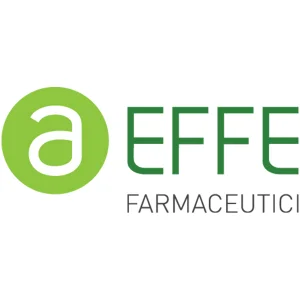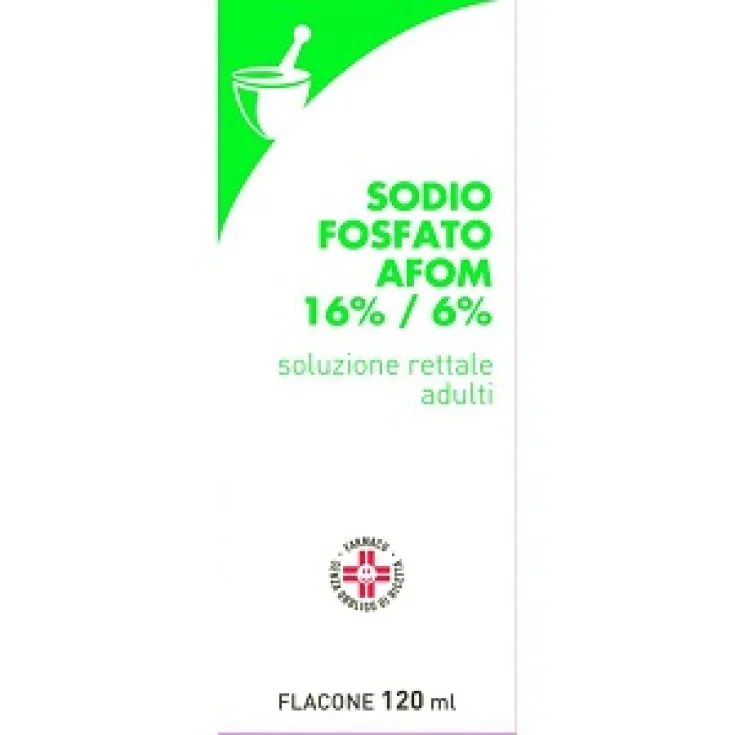Sodium Phosphate AFOM 16% + 6% Rectal Solution 120ml

- Brand: AEFFE FARMACEUTICI Srl
- Product Code: 029910015
- EAN:
- Availability: In Stock (evaso in 24 ore)
- 3 items
for 2,18€ each - 4 items
for 2,13€ each - 5 items
for 2,09€ each
Sodium Phosphate AFOM 16% + 6%
Rectal Solution
Therapeutic indications
Treatment of constipation.
Clinical conditions that require pre and post-operative intestinal emptying, in preparation for radiological examinations and endoscopic investigations of the last intestinal tract.
Posology and method of administration
Adults and adolescents (12 - 18 years): 1 bottle of 120 ml. Do not use more than one bottle per day.
Each bottle is to be used for one administration only; any remaining medicine must be discarded.
Administration can be practiced at room temperature. If you prefer lukewarm, just put the bottle in contact with hot water (by immersion or under the tap). For a better effect it is advisable to practice the administration in a lying position on the left side. For a greater cleaning action, assume the genupectoral position for a few minutes, immediately after administration.
Instructions for Use
Before using the product, push the cannula cover down until the safety seal of the bottle breaks.
Remove the protective cap from the rectal cannula.
Grasp the bottle and gently introduce the cannula into the rectum, then squeeze the bottle thoroughly. A residue of solution is expected to remain in the bottle.
At the end of the administration, remove the cannula and discard the empty bottle in its own box according to the rules of disposal of medicines
Remain lying down until an urgent need to evacuate, which usually occurs within 5 minutes. In any case, it is not necessary to hold the enema for more than 10-15 minutes.
![]() Contraindications
Contraindications
Hypersensitivity to the active substance or to any of the excipients.
Acute abdominal pain or of unknown origin, nausea or vomiting, intestinal obstruction or stricture, intestinal sub- occlusion, mechanical ileus, paralytic ileus, inflammatory bowel disorders and other conditions that may increase drug absorption rectal bleeding of unknown origin, haemorrhoidal crisis acute with pain and bleeding, severe dehydration, children under the age of twelve.
Phosphates are contraindicated in patients with heart disease, severe renal insufficiency or in the presence of hyperphosphatemia.
Special warnings and precautions for use
The 120 ml bottle is not for use in children under 12 years of age. The abuse of laxatives (frequent or prolonged use or with excessive doses) can cause persistent diarrhea with consequent loss of water, mineral salts (especially potassium) and other essential nutritional factors.
In the most severe cases, dehydration or hypokalaemia may develop, which can lead to cardiac or neuromuscular dysfunctions, especially in the case of simultaneous treatment with cardiac glycosides, diuretics or corticosteroids.
The abuse of laxatives can cause addiction (and, therefore, the possible need to gradually increase the dosage), chronic constipation and loss of normal intestinal functions (intestinal atony).
Repeated use of laxatives can give rise to addiction or damage of various kinds. Prolonged use of a laxative for the treatment of constipation is not recommended.
The pharmacological treatment of constipation must be considered an adjuvant to the hygienic-dietetic treatment (eg increase of vegetable fibers and fluids in the diet, physical activity and re-education of intestinal motility).
The treatment of chronic or recurrent constipation always requires the intervention of the doctor for the diagnosis, the prescription of drugs and the surveillance during the course of therapy.
A careful evaluation by the doctor is essential when the need for the laxative derives from a sudden change in previous bowel habits (frequency and characteristics of bowel movements) that lasted for more than two weeks or when the use of the laxative fails to produce effects.
Elderly people or those in poor health should consult their doctor before using the
medicinal.
In episodes of constipation, it is recommended first of all to correct eating habits by integrating the diet
daily with an adequate intake of fiber and water.
When using laxatives it is advisable to drink at least 6-8 glasses of water or other liquids a day, in order to facilitate the softening of the stool.
Interactions
Systemic absorption of sodium phosphate solution in the rectum is limited; however in some conditions it may be increased and predispose to possible interactions with other drugs.
The simultaneous intake of drugs that can affect the electrolyte balance (diuretics, steroids, etc.) can facilitate the onset of hyperphosphatemia, hypercalcemia and hypernatremia.
Patients taking drugs capable of prolonging the QT interval may be at increased risk of developing this adverse reaction when treated concomitantly with sodium phosphate.
Concomitant use of calcium supplements or calcium-containing antacids may increase the risk of ectopic calcification.
Pregnancy and breastfeeding
There have been no adequate and well-controlled studies on the use of the medicine during pregnancy or breastfeeding.
Although there are no obvious contraindications to the use of the medicine during pregnancy and breastfeeding, it is recommended to take the medicine only in case of need and under medical supervision.






